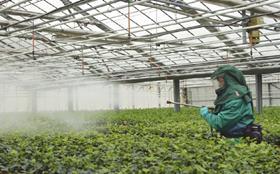
In a move that could seriously shake up the Australian fresh produce industry, the Australian Pesticides and Veterinary Medicine Authority (APVMA) has recommended a suspension in the use of the chemical dimethoate.
Dimethoate is widely used to control Queensland fruit fly, among a range of other insect pests, but has been linked with health risks in consumers.
As part of its review of the chemical, the APVMA concluded that “some of the estimated exposures for consumers are above the health standard, reducing, but not breaching the margins of safety that are normally in place to protect consumers from short-term dietary risks”.
The authority has proposed an interim suspension of dimethoate use until further study of the health risks are completed, and has asked suppliers and users of the product to “show cause” why such action should not be taken by 13 September.
If the APVMA is not convinced otherwise by that date, it plans to put in place the suspension by the end of September.
The potential impact of dimethoate suspension is huge for the Australian industry. The chemical is a key element in control and treatment of Queensland fruit fly, and has no easy replacements. The chemical fenthion, which is used for similar purposes, is itself under investigation over health concerns by the APVMA, with the results of that investigation due next year.
Domestic market
Suspension of the chemical will seriously disrupt the Australian domestic market, with a large number of interstate trade regulations requiring dimethoate treatment for fruit fly.
“It will impact all fruit fly host products coming out of Queensland, and it’s going to have some pretty significant impacts on those supplies in to the southern states, particularly Victoria,” explained Maxwell Summers, CEO of the Australian Horticultural Exporters Association.
He said if Queensland winter supplies weren’t able to access the southern and western states, the industry would have to return to greenhouse production, which would involve a serious rise in prices.
Exports
On the export front, the suspension of dimethoate could have serious implications for the control of the kind of fruit fly outbreaks New South Wales and Victorian growers have seen over the last 12 months, according to Summers.
“Be assured the people who use dimethoate for regulating fruit fly outbreaks in Victoria are very nervous about what’s going on,” he told Produce Plus. “If the chemical use is removed, when they get an outbreak they’ll just have to close up shop. They won’t be able to control infestations of fruit fly. So they’re very anxious; without this chemical, there’s no option at the moment.”
Beyond the direct impact, the flow-on effects from the domestic market on exports are also likely to be heavy on certain products.
Domestic strawberry demand is largely supplied by Queensland, and export prices from production in Western Australia (WA) is tied to the domestic market.
“If it did happen there would be a big flow-on effect for WA,” predicted Jamie Michael, export manager for WA’s biggest strawberry exporter TI Produce. “It would mean we have a much larger market with much less competition, particularly in New South Wales and Victoria, and with increased demand comes higher prices.
“It would be good for us, but I would hope the government gets a solution together, because nobody wants to see farmers’ livelihoods in jeopardy.”
The impact on trade to New Zealand would also be serious. Queensland is a major supplier of winter vegetables and other products to the neighbouring country, many of which require dimethoate treatment. Residues of dimethoate and fenthion have been a cause of friction between the two in the past.
Alternatives
Dimethoate and fenthion have no clear replacements. The chemical methyl bromide can be used in some instances, but has its own quality and health concerns.
For post-harvest use, irradiation does provide some options, but the technology has a host of practical and public perception problems.
“We don’t have the capacity to irradiate one twentieth of the supply for the domestic market, let alone exports,” Summers said. “`And` it’s a multi-million dollar project to build an irradiation facility, and the industry just doesn’t have the money.”
Consumers are also unfamiliar with irradiation, and the technology has faced a backlash from consumer groups in markets around the world, despite little evidence of health risks.
“The bureaucrats are looking at irradiation, but the supermarkets are just spinning out,” said Summers. “They think they can’t sell irradiated fruit.”
The Australian industry currently uses irradiation primarily for mango exports to Asia, New Zealand and potentially the US under a recently developed protocol.
The industry is hoping one potential solution, at least in the interim, is to extend the required withholding period for dimethoate after treatment to ensure lower residues on landed product.



